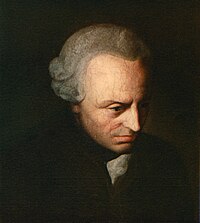Our website is made possible by displaying online advertisements to our visitors.
Please consider supporting us by disabling your ad blocker.
Transcendental idealism
This article includes a list of general references, but it lacks sufficient corresponding inline citations. (November 2013) |
| Part of a series on |
| Immanuel Kant |
|---|
 |
|
Category • |
Transcendental idealism is a philosophical system[1] founded by German philosopher Immanuel Kant in the 18th century. Kant's epistemological program[2] is found throughout his Critique of Pure Reason (1781). By transcendental (a term that deserves special clarification[3]) Kant means that his philosophical approach to knowledge transcends mere consideration of sensory evidence and requires an understanding of the mind's innate modes of processing that sensory evidence.[4]
In the "Transcendental Aesthetic" section of the Critique of Pure Reason, Kant outlines how space and time are pure forms of human intuition contributed by our own faculty of sensibility. Space and time do not have an existence "outside" of us, but are the "subjective" forms of our sensibility and hence the necessary a priori conditions under which the objects we encounter in our experience can appear to us at all. Kant describes time and space not only as "empirically real" but transcendentally ideal.[5]
Kant argues that the conscious subject recognizes the objects of experience not as they are in themselves, but only the way they appear to us under the conditions of our sensibility. This fits his model of perception outlined at the outset of the "Transcendental Aesthetic" by which he distinguishes the empirical reality of appearances studied by the empirical sciences from the noumenal reality of things as they are in themselves, independent of empirical observation.[6] Thus Kant's doctrine restricts the scope of our cognition to appearances given to our sensibility and denies that we can possess cognition of things as they are in themselves, i.e. things as they are independently of how we experience them through our cognitive faculties.[7]
- ^ Kitcher, Patrica (1996) [First edition originally published in 1781; second edition originally published in 1787]. "Introduction by Patricia Kitcher, 3. Transcendental Aesthetic: The Science of Sensory Perception, B. Space, Time, and Mathematics". Critique of Pure Reason. By Kant, Immanuel. Translated by Pluhar, Werner S. (Unified Edition with all variants from the 1781 and 1787 editions ed.). Indianapolis/Cambridge: Hackett Publishing Company, Inc. p. xxxvi. ISBN 0-87220-257-7.
This is one of the first conclusions of "transcendental idealism," Kant's own name for his philosophical system, and we need to pause to consider it carefully to avoid some standard misunderstandings.
- ^ Kitcher, Patrica (1996) [First edition originally published in 1781; second edition originally published in 1787]. "Introduction by Patricia Kitcher, 2. Prefaces and Introduction: Kant's Central Problem". Critique of Pure Reason. By Kant, Immanuel. Translated by Pluhar, Werner S. (Unified Edition with all variants from the 1781 and 1787 editions ed.). Indianapolis/Cambridge: Hackett Publishing Company, Inc. p. l. ISBN 0-87220-257-7.
Kant prefaces the Critique with a lament about the sad state of metaphysics. But his program for reform is thoroughly epistemological. It is only by working our way to a better understanding of the sources and limits of human knowledge that we will be able to figure out what metaphysical questions can fruitfully be asked.
- ^ Kitcher, Patrica (1996) [First edition originally published in 1781; second edition originally published in 1787]. "Introduction by Patricia Kitcher, 2. Prefaces and Introduction: Kant's Central Problem". Critique of Pure Reason. By Kant, Immanuel. Translated by Pluhar, Werner S. (Unified Edition with all variants from the 1781 and 1787 editions ed.). Indianapolis/Cambridge: Hackett Publishing Company, Inc. p. l. ISBN 0-87220-257-7.
Because of the unusual nature of his enterprise, Kant gave it a special name: "transcendental" philosophy. The goal of transcendental philosophy is to investigate the necessary conditions for knowledge with a view to showing that some of those necessary conditions are a priori, universal and necessary features of our knowledge, that derive from the mind's own ways of dealing with the data of the senses. The term "transcendental" has often been a source of confusion, because it includes three not obviously related ideas: (1) the idea that some conditions are necessary for knowledge and (2) the idea that some claims are a priori, in stating necessary and universal features of the world, and (3) the idea that some features of our knowledge are a priori, in the sense that they do not derive from sensory evidence, but from our minds' ways of dealing with sensory evidence. What is distinctive about Kant's philosophy is his belief that some of the necessary conditions for knowledge are also a priori, in all four sense of that term: they are universal, necessary, cannot be established by sensory experience, and reflect the mind's ways of dealing with sensory experience; the term "transcendental" constantly draws attention to that complex doctrine.
- ^ Durant, Will (1933). "VI. Immanuel Kant and German Idealism, III. The Critique of Pure Reason, 1. Transcendental Esthetic". The Story of Philosophy. New York: Simon & Schuster (published 1953). p. 267.
The effort to answer this question, to study the inherent structure of the mind, or the innate laws of thought, is what Kant calls "transcendental philosophy," because it is a problem transcending sense experience. "I call knowledge transcendental which is occupied not so much with objects, as with á priori concepts of objects."—with our modes of correlating our experience into knowledge.
- ^ Kant 1999, p. A36/B52.
- ^ Kant 1999, p. A20/B34.
- ^ Kant 1999, p. A84–130, B116–169.
Previous Page Next Page


